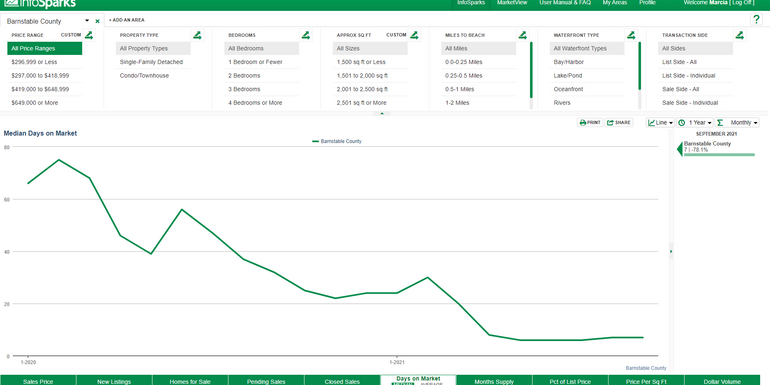InfoSparks Insights: “When is the best time to sell my house?”
October 21, 2021 MLS Updates MarketStats Staff

You are constantly being asked questions about our local market, such as “When is the best time to sell my house?” According to usage numbers gathered, many agents rely on reports: close to 20 million InfoSparks charts were generated in August alone*.
The answers to common questions often depend on what the seller wants to achieve. Are they looking to get the highest price? Or the quickest sale?
Your market knowledge and real estate experience provides insights on how to answer these questions. But tools such as InfoSparks can help you provide the “When is the best time to sell my house?” questioner with a customized answer based on their type of home, neighborhood, local market and more. Better yet, you can quickly and knowledgeably answer the question with a few taps on your phone or tablet, or a few mouse clicks on your laptop.
When is the best time to sell my house … for the highest price?
In this example, sellers in the Twin Cities Region want to sell their previously owned, single-family property for the highest price. With InfoSparks, you can select:
- ‘Single Family’ Property Type
- ‘Previously Owned’ Construction Type
- ‘Traditional’ Seller Type
Then, by searching activity going back five years and searching by Median Sales Price, you discover that the highest Median Sales Price in each of the last five years typically came in June:
So, your answer — also knowing how long the closing process takes in your market— would be:
“Sellers in this neighborhood who close on the sale of their home in June have typically received the highest Median Sales Price during the last five years. Since it usually takes 30-60 days for a home to close once it’s on the market, I would recommend we list your home in April or May.”
When is the best time to sell my house … quickly?
Maybe sellers with a previously owned, single-family home aren’t looking for the best price. Instead, they need to get out quickly and move across the country for a job relocation.
Selecting the same metrics from the previous example — only this time sorting by Average Days on Market — you discover homes that closed in July during the last five years have historically had the fewest Days on Market:
So, your answer would be:
“Sellers who have closed on the sale of their home in July have typically had their home on the market for the shortest amount of time, with last year’s Average Days on Market being 30 days in July. That metric is trending downward overall, so you could reasonably expect to sell your home even quicker.”
Remember: These are only examples. Markets vary, and no one knows their market as well as you, the experienced real estate agent.
InfoSparks can help answer a lot of questions, but it’s not about giving an end-all, be-all answer. Instead, it gives you information to help support your own experience and knowledge.
